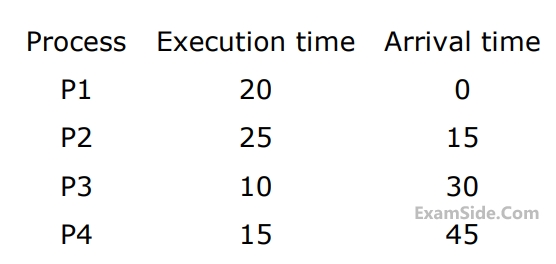1
GATE CSE 2007
MCQ (Single Correct Answer)
+2
-0.6
An operating system uses Shortest Remaining Time first $$(SRT)$$ process scheduling algorithm. Consider the arrival times and execution times for the following processes:


What is the total waiting time for process $$P2?$$
2
GATE CSE 2006
MCQ (Single Correct Answer)
+2
-0.6
Consider three processes, all arriving at time zero, with total execution time of $$10,20,$$ and $$30$$ units, respectively. Each process spends the first $$20$$% of execution time doing $${\rm I}/O$$, the next $$70$$% of time doing computation, and the last $$10$$% of time doing $${\rm I}/O$$ again. The operating system uses a shortest remaining compute time first scheduling algorithm and scheduling a new process either when the running processes gets blocked on $${\rm I}/O$$ or when the running process finishes its compute burst. Assume that all $${\rm I}/O$$ operations can be overlapped as much as possible. For what percentage of time does the $$CPU$$ remain idle?
3
GATE CSE 2006
MCQ (Single Correct Answer)
+2
-0.6
Consider three processes (process id $$0,1,2,$$ respectively) with compute time bursts $$2, 4,$$ and $$8$$ time units. All processes arrive at time zero. Consider the longest remaining time first $$(LRTF)$$ scheduling algorithm. In $$LRTF$$ ties are broken by giving priority to the process with the lowest process id. The average turn around time is
4
GATE CSE 2005
MCQ (Single Correct Answer)
+2
-0.6
Consider the following code fragment:
Let $$u,v$$ be the values printed by the parent process, and $$x,y$$ be the values printed by the child process. Which one of the following is TRUE?
if (fork() == 0)
{
a = a + 5;
printf("%d, %d \n", a, &a);
}
else
{
a = a - 5;
printf ("%d, %d \n", a, &a);
}Let $$u,v$$ be the values printed by the parent process, and $$x,y$$ be the values printed by the child process. Which one of the following is TRUE?
Questions Asked from Process Concepts and Cpu Scheduling (Marks 2)
Number in Brackets after Paper Indicates No. of Questions
GATE CSE 2025 Set 1 (1)
GATE CSE 2024 Set 2 (1)
GATE CSE 2022 (1)
GATE CSE 2020 (1)
GATE CSE 2019 (1)
GATE CSE 2016 Set 2 (1)
GATE CSE 2015 Set 3 (1)
GATE CSE 2015 Set 1 (1)
GATE CSE 2014 Set 3 (1)
GATE CSE 2014 Set 2 (1)
GATE CSE 2014 Set 1 (1)
GATE CSE 2012 (1)
GATE CSE 2011 (1)
GATE CSE 2009 (1)
GATE CSE 2008 (2)
GATE CSE 2007 (1)
GATE CSE 2006 (2)
GATE CSE 2005 (1)
GATE CSE 2004 (1)
GATE CSE 2003 (1)
GATE CSE 2002 (2)
GATE CSE 2001 (1)
GATE CSE 1999 (2)
GATE CSE 1998 (1)
GATE CSE 1996 (1)
GATE CSE 1995 (1)
GATE CSE 1993 (2)
GATE CSE 1992 (1)
GATE CSE 1990 (1)
GATE CSE 1988 (1)
GATE CSE Subjects
Theory of Computation
Operating Systems
Algorithms
Database Management System
Data Structures
Computer Networks
Software Engineering
Compiler Design
Web Technologies
General Aptitude
Discrete Mathematics
Programming Languages